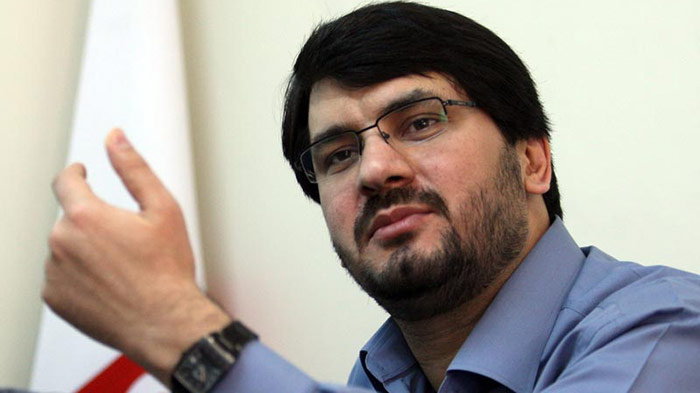A Portrait of the Politician as a Young Man

Last week, the Principlist Fars News Agency reported that Mehrdad Bazrpash had visited prominent cleric and Principlist president-maker Ayatollah Mesbah Yazdi. According to the report, Bazrpash has briefed the Ayatollah on the country’s status quo. Even though the report declined to provide further details, what turned many heads was the length of the visit: it had lasted about three hours.
Even more thought-provoking was the report’s special emphasis on Bazrpash’s title, introduced as former vice president, without ever mentioning his tenure as a lawmaker in the ninth parliament. Bazrpash, who has no official job but the management of hardliner daily Vatan Emrooz, was voted in the ninth parliament as Tehran’s representative. In the last two years of his term, backed by the Principlist bloc as well as members of the hardliner Paydari Front, he raised to a higher place, namely the parliament’s board of directors.
When putting together pieces of the puzzle, the image of a young president like Ahmadinejad back in 2005 appears aborning. This comes after many Principlists have recently spoken about the need for the camp’s return to the 2005 example, saying the only way to overcome the Reformist rivals will be unveiling an election phenomenon who could win popular support; a new face with the ability to introduce himself as standing out from the mainstream.
Over the past few years in the Vatan Emrooz, Bazrpash has tried to be the epitome of a politician familiar with media. Even though experts believe the paper has little more than a headline accompanying a cover photo, it seems that it is enough for the Principlists, still stuck in Kayhan’s style of journalism, to accept him as a man of politics and media.
More important are perhaps reports, pouring from several corners, which indicate Bazrpash has started election tours and even launched his campaign in religious cities like Mashhad and Qom. Last Thursday, Bazrpash headed south to Isfahan, spending his weekend on speeches critical of the incumbent administration.
A Portrait of the Politician as a Young Man
The inception of the well-built young Principlist’s political activities coincided with Bazrpash’s admission into university, when he stood, as the head of Sharif University’s Students’ Basij organization, against yet another group of students who were gathering to protest a controversial death sentence issued for historian Hashem Aghajari on charges of blasphemy in 2002.
When Mahmoud Ahmadinejad became Tehran Mayor in the latter half of Mohammad Khatami’s presidency, Bazrpash was appointed chief of the mayor’s Young Counselors, a group covertly in charge of recruiting and organizing forces in the capital’s neighborhoods as a prelude to the 2005 election. Another turning point in the upstart politician’s life was when, at the age of 23, he married daughter of Ahmadinejad’s brother-in-law and Education Minister Alireza Ali-Ahmadi. His portfolio took a yet another promotion five years later when he started working as the CEO of Pars Khodro, a giant auto maker. In only ten months, he made history as one of the youngest industrial managers, as the CEO of yet another auto-industry giant, Saipa.
However, the fruit of the engineer’s career in the country’s auto-industry was nothing more than a name. Heavy propaganda and costs spent on launching the production line of an indigenous car called ‘Miniature’ was met by criticisms of the project’s non-Persian name. He later failed to propel the drive of for his piece of ‘industrial art’, leaving his portmanteau masterpiece of art and engineering in oblivion forever.
Nonetheless, the title used in the coverage of his meeting with Ayatollah Mesbah Yazdi concerned Ahmadinejad’s second administration, where the 30-year-old Bazrpash was appointed in 2009 as vice president and director of the National Youth Organization.
Parts of the Principlist camp want to follow the example of the 2005 presidential race for 2017 and unveil what they call a ‘young phenomenon’ to turn the tables to their own advantage. However, almost every part of Bazrpash’s political and managerial record is of appointive nature. An exception is his relative success in the ninth parliamentary election in 2009, when Reformists refused to take part following events that came after Ahmadinejad’s disputed reelection. Apart from that victory, achieved in the wake of meager turnout in Tehran and many other cities, Bazrpash has never won an election. Add to that the fact that Mehrdad Bazrpash ran in the tenth parliamentary elections, with his individual campaign going along collective ones brokered for a list of Tehran hopefuls backed by the Principlists. However, he was handed a bitter defeat like every other Principlist and the Reformist-moderate coalition won every chair available for the capital.
By: Ali Attaran

